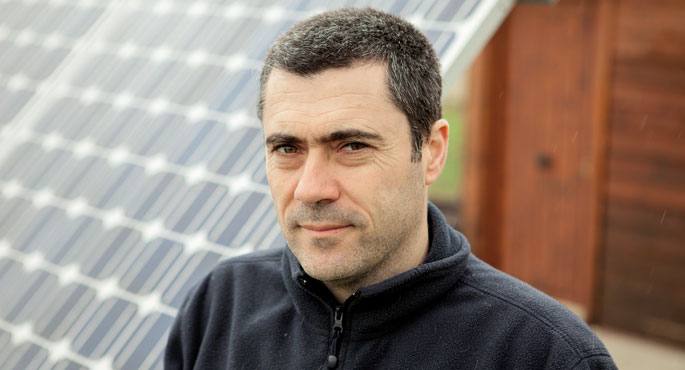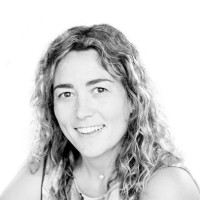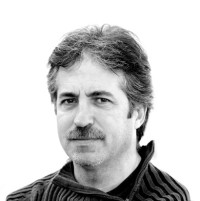Competitiveness is well integrated into the collective unconscious of the Basques
- Environmental education expert, meteorologist, blogger, harrijasotzaile and bertsolari. Illustrated baserritarra of the 21st century.

You were responsible for the Ikasle Abertzaleak group during your period as a student. Was that your first public activity?
Yes, I was there for several years. We live in very beautiful and active times in the creation of the university. For example, we organized the first battle over rising rates. Mobilizations against military service were also at that time in full swing. These were really interesting years.
Now you are director of the School Farm within the Haritz Berri Foundation of Ilundáin. What are you doing here?
The Foundation works with young people with problems through different programs. To do this work right now, we at the Foundation are working about 200 workers. Some of these young people participate in the Baserri Eskola programme, and in addition, here we work on environmental education, especially with schools, families, young people and retirees.
How many young people now live in Ilundáin?
The Children's Center has 14 children. In addition, in Beloso, Mutilva and Zolina we have other residences. In total, there are 50 young people living in them. And another 100 people come in the morning to day programs: carpentry, masonry and gardening. Some of the people who live here have arrived by order of the National Court judge charged with crimes, among other crimes. The rest, on the contrary, are young people with family difficulties or social insertion difficulties. People with drug-dependency problems move to other centres. Here come, in particular, those who have behavioural problems, for a while. For some boys and girls, stays are extended to five or six years. In addition to the work of the farmhouse and the garden, plumbing and electricity workshops are also carried out, among others. The aim is to equip them with knowledge that will enable them to be autonomous and then reintegrate into society. In most cases, good results are obtained. In this sense, the Foundation does a great job, because if these young people were on the street, the risk would multiply.
Are you your second parents?
The educators here have a great vocation. I only coordinate the work they do in the farmhouse. Then you see that they come very comfortable. In many cases, their first direct relationship with animals and nature is that of animals. Being with animals is very beneficial to them, a kind of therapy. These types of therapies are increasingly being done with people with behavioral problems and the results are very positive. It is observed, in a way, that this relationship with the environment, with animals is something that every human being needs. We used to have the opportunity to do so at home, but in today ' s society the population is, above all, in the cities, and in the large towns this rural environment has been lost.
What is your daily relationship with these young people?
Relationships are normal. In short, the young people at the Haritz Berri Foundation are very similar to the other young people, but they have had serious problems in their lives and that has conditioned them enormously. Working with them, you quickly realize how privileged we have been in our lives.
From schools you also receive many visiting groups throughout the year. How many children?
About 6,000 children a year. The beginning of the course has been more pathetic but now we have visits every day. About 75% of the boys and girls in the schools that go to the school farm are boys and girls from Pamplona and its region. Anyway, you can say that those who come from Altsasu, Elizondo or Ribera also live in an urban environment, and they love working with animals. We conducted the sessions in Spanish and Basque and in the summer camps we have also begun to offer English. For a week, children become baserritars and engage in environment-related activities.
Nice work for you!
Very nice, I'm very comfortable. That's how we grew up, in a hamlet like before. This model is practically lost and the baserritars or cows of meat, or the sheep, or the stack of pigs that are at present have. In Ilundain we show what the traditional, varied farmhouse was like. In addition, we work on many topics through programs: ecological garden, nurseries, renewable energies, forest, climatology, recycling…
You know a lot about the time. How have you learned?
I've always had a hobby. I heard my parents, I read it, and especially Pello Zabala. With your book and blog you learn a lot.
For example, do seasons work to predict time?
With time, we can know what winds will predominate in the next season, and we know what those winds normally bring, but nothing else. They should be taken as a trend. From there, it is impossible to guess. This year's rains have not been announced, they have not been normal: In two months, between January and February, more than 400 litres per square metre have been recorded. Half of what is usually thrown all year round. March has also left, but as my mother said: “The months starting on Fridays are often confusing.”
Rural sports are your other big hobby.
I started on the boat, I've made a race of sacks and a little bit of sokatira, but above all, stone-throwing in recent years. Lately, I'm a pretty sculptor with the chainsaw. Very comfortable. I do everything: goats, crocodiles… and lately I'm with faces. I do something every week. The work is done quite quickly. You first look at the proportions and the shapes, and then you take the chainsaw, which at first has a weight of 12 or 15 kilos, then a half, and a quarter and a half pounds of a 25-centimeter sword for more concrete work.
He has been president of the Federation of Navarre of Herri Kirolak and now responsible for the Sakana stone school. How do you see rural sports? Is there a hobby between children and young people?
Yes, yes. If you're looking at a basic organization, if it's not the first year, they'll be approaching the next year or the next year. We cannot have too many students because they are offered very personalized attention. We now have six students and we are quite satisfied with that figure. I see this moment in rural sport quite nice. There is a good level. There are many young aizkolaris and there are also harrijasotzailes. Sport is increasingly being structured and schools are being created here and there. We are not in a position to throw the boats, but they are doing things and there is a hobby. In Berriozar there is a very good school: a lot of sokatira, trza and sport are practiced, in Baztan-Bidasoa there are also many types of rural sport, in the Sakana there is an aizkolaris school and a group of sokatira for girls, in Irurtzun there is a lot of rural sport...
Athlete and coach, but also blogger, writer and spiker…
I really like disclosure. We are moving mainly on weekends. I'm going to see the tests, I'm doing a report, I'm taking some pictures and all of that I'm putting on the blog. The truth is, I have a lot of followers, about 60,000 throughout the year. The new technologies have made it very easy. You can write on a blog almost free of charge; yes, we don't earn anything, but we spend.
What's the biggest brand you've made with the stone?
Ten years ago, I lifted the double-story, 160-pound stone, in a five-minute shift, I lifted it up six times. I usually walk with 100 kilos of stones. I don't run championships anymore. We have to do very deep formations, because the level is quite high.
Again, Inaxio Perurena raised the 300 kilos, which was replaced by Iñaki Perurena.
It's terrible. Only four harrijasotzailes have achieved this, in the Basque Country and in the world: their father, Migeltxo Saralegi and Iñaki Otaegi Gibitegi, the goiaztarra.
Similar games to rural sports are also practised in other parts of the world.
Yes, but compared to them, the tests here are much longer and harder. In Australia, for example, a trunk is cut and it's already there. Here, eight, ten or twenty, in betting. Strength tests also collect the highest weight weights possible, but once, and here, instead, a 100 kilogram stone is collected, over and over, whenever possible. In this sense, the Basque does not like to suffer, but somehow likes that hardness of sport. This requires a lot of psychological strength.
Why do so many Basques like sport?
In my opinion, the Basques like competition and fighting, in different areas. It's something we have inside. My father has also been aizkolari and since he was a child he has lived that environment, and I like it. It's curious. The same thing happens with verses. I'm a bad athlete, but I love training. As the day and the weekly hour come, meet and pull out everything we have. We get together five or six people and get into the fight. So we're happy, we don't need much.
This rivalry, as you say, is also seen in other areas of life.
There is a special passion for play that has been maintained so far through betting, for example in the case of rural sport, even though society has changed a great deal. I believe that this is something that is well embedded in the collective unconscious of the Basques. Our culture has been linked to the rural environment, and in that area life is very hard. Daily work has been put in competition in free time. It is one of the hallmarks of our culture: we have always been linked to life and work. Competitiveness, understood in its good sense, is not bad, on the contrary, if it is combined with values such as respect and solidarity, it is beneficial to individuals and society.
And where do you get the time from?
I have always said that energy is more important than time. If you have energy, you take time for everything. You can make a small organization. I, for example, do an hour or more every week with the stone, on weekends I take another time to go to the mountain. Write something on the blog half an hour a day, usually in the evening, after the children have gone to bed. I take a couple of hours a week to play with the chainsaw. Of course, you have to leave the television and things like that. However, I have no merit, because I do things I like.
1970eko abenduaren 14an Azpirotzen jaioa. Aita hangoa eta ama Errazkingoa. Baserri giroan hazia, Lekunberrin eta Oronozen ikasi ondoren, Nafarroako Unibertsitate Publikoan Nekazal Ingeniaritza Teknikoan lizentziatu zen. Bost urtez lan egin zuen EHNE sindikatuan eta 2001etik hona Ilundain Haritz Berri Fundazioan ari da, Baserri Eskolako zuzendari. Nafarroako Herri Kirol Federazioko lehendakaria izan zen hiru urtez eta gaur egun Sakanako Harrijasotze Eskolako arduraduna da. Herri-kirolari buruzko zenbait argitalpen idatzi ditu, Nafarroako Federazioak eskatuta: harrijasotzea, aizkora, trontza, Iparraldeko jokoak, sokatira eta segari buruzko lan dibulgatiboak. Hori bera da bere blogaren zioa. Baina ez hori soilik, bertan aktualitateaz mintzo eta, tarteka, bere bertsoak ere plazaratzen baititu.
“Gaur egungo gizartearen ahultasun asko ekonomiaren globalizazioari lotuta daude. Mundu mailako merkatu libre horiek ez dute ez bihotzik ez sentimendurik, irabaziak lortzea da euren helburu bakarra. Konpetitibitatea zentzu horretan ulertuta oso txarra da. Gizartearen garapena gaur egungo eztabaidaren lehen planoan ipini behar da, horrek suposatzen duen guztiarekin, errespetua, elkarbizitza, jasangarritasuna, elikadura subirautza... Gogorra da esatea, baina krisiari esker jokamolde batzuk ari gara aldatzen. Jendeak berogailuak modu arrazionalagoan erabiltzen ditu. Autoa ez da hartzen lehen bezainbeste. Kontsumitzeko garaian gehiago begiratzen da eta behar ez dena ez da horrenbeste erosten”.
How easy we judge people next to (or not next to). Everything else is easy, except for your own. We then seek a solution to others. And how hard it is to manage what you have inside. Many times we idealize specific people, as if they were all right. And how little we know about... [+]
Duela hogei urte izan zen, Japoniako Akita hirian jokatu zen txapelketa batean: podiumetik alde egin zuen Sakanako sokatira taldeak Espainiako ereserkia entzutean. Une hura eta geroko zalaparta ondo gogoan dute Bea Razkinek eta Nerea eta Belen Lizarragak, aldarria egin zuten... [+]
There are numerous measures that are being taken in our environment to improve the quality of sport, both to concretize the minimum training of technicians of different levels and areas, and to promote their professionalism, as well as to promote specialisation in the sports... [+]
I believe that in any negotiation internal reflections before sitting at the table are very important. We must measure the forces of those involved and know how far you are prepared to go. Regretting what you've done, what you've said, and above all what you've signed, will make... [+]
Ane Elordi (Zornotza, 1991) Arratiako Harriti nesken taldera batu zen orain hiru bat hilabete. Talde lanean 500 kiloko harriari tiraka erakustaldiak eskaintzen dituzte. Indarra behar da, baina gakoa koordinazioan dagoela dio.
Suedian jokatutako txapelketan lortu dute domina, lur gaineko 580 kilogramoko proban lehiatuta. Sokatirako taldeak 2014an lortu zuen ofizialtasuna.






















